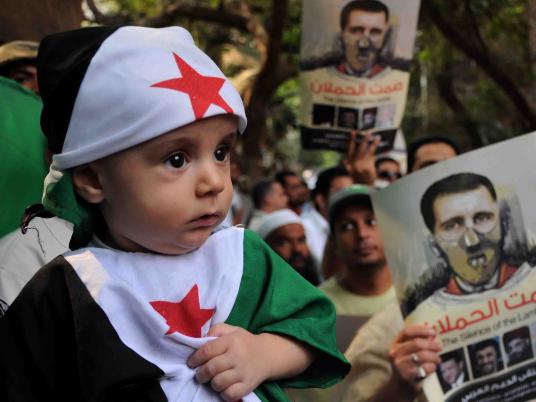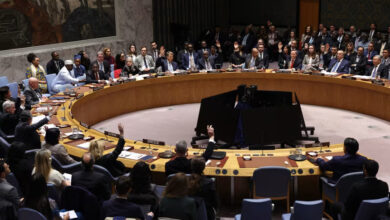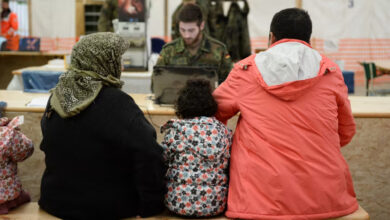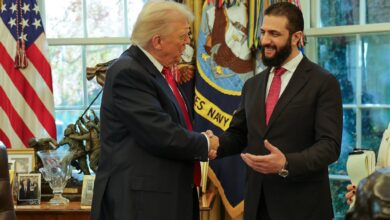
At least 15 people died in fierce fighting between security forces and army rebels in northern Syria early on Saturday, activists said, as violence intensified in the eighth month of unrest against President Bashar al-Assad.
Opposition groups say rebel forces are increasing their attacks on security forces loyal to the government, which is trying to suppress the revolt against 41 years of Assad family rule.
Syria faces deepening international and regional isolation, with the Arab League, the European Union and the US piling on increasingly tough sanctions to pressure Damascus to stop the bloodshed and talk to its opponents.
The Syrian Observatory for Human Rights said the fighting broke out around midnight in the northern city of Idlib, near the Turkish border.
"Seven were killed from the army and regime security forces, including an army officer," the group said. "Three civilians and five defectors were also killed."
The United Nations' top human rights forum has condemned Syria for "gross and systematic" violations by its forces, including executions and the imprisonment of some 14,000 people.
Syrian authorities say they are fighting foreign-backed "terrorist groups" trying to spark civil war who have killed some 1100 soldiers and police since March.
More than 4000 people have died since protests broke out in March, according to the United Nations, which says the violence in Syria looks like civil war.
Violence on Saturday spread to the central city of Homs and the southern Deraa province by midday, the British-based human rights group said.
In Homs, a hotbed of armed revolt against the military crackdown on protests, two men were shot dead, one by a sniper, the organization said.
The group said security forces were also conducting raids in rural Deraa province, cradle of the anti-Assad movement. It said one civilian was killed and five were wounded during morning raids in the town of Tafas.
No Iran ties post-Assad
The head of the leading opposition group, the Syrian National Council (SNC), said he is pushing for more international intervention against Damascus and is trying to get Russian support for mostly Western-backed actions.
Burhan Ghalioun told the Wall Street Journal that he envisioned a post-Assad Syria distanced from anti-Western Iran and Hezbollah and would move closer to the Arab League as well as Gulf Arab states At least 15 people died in fierce fighting between security forces and army rebels in northern Syria early on Saturday, activists said, as violence intensified in the eighth month of unrest against President Bashar al-Assad.
Opposition groups say rebel forces are increasing their attacks on security forces loyal to the government, which is trying to suppress the revolt against 41 years of Assad family rule.
Syria faces deepening international and regional isolation, with the Arab League, the European Union and the United States piling on increasingly tough sanctions to pressure Damascus to stop the bloodshed and talk to its opponents.
The Syrian Observatory for Human Rights said the fighting broke out around midnight in the northern city of Idlib, near the Turkish border.
"Seven were killed from the army and regime security forces, including an army officer," the group said. "Three civilians and five defectors were also killed."
The United Nations' top human rights forum has condemned Syria for "gross and systematic" violations by its forces, including executions and the imprisonment of some 14,000 people.
Syrian authorities say they are fighting foreign-backed "terrorist groups" trying to spark civil war who have killed some 1,100 soldiers and police since March.
More than 4,000 people have died since protests broke out in March, according to the United Nations, which says the violence in Syria looks like civil war.
Violence on Saturday spread to the central city of Homs and the southern Deraa province by midday, the British-based human rights group said.
In Homs, a hotbed of armed revolt against the military crackdown on protests, two men were shot dead, one by a sniper, the organization said.
The group said security forces were also conducting raids in rural Deraa province, cradle of the anti-Assad movement. It said one civilian was killed and five were wounded during morning raids in the town of Tafas.
No Iran ties post-Assad
The head of the leading opposition group, the Syrian National Council (SNC), said he is pushing for more international intervention against Damascus and is trying to get Russian support for mostly Western-backed actions.
Burhan Ghalioun told the Wall Street Journal that he envisioned a post-Assad Syria distanced from anti-Western Iran and Hezbollah and would move closer to the Arab League as well as Gulf Arab states — countries that are Sunni-led and wary of Iran, which is a non-Arab, Shia power in the region.
Syria has fostered close ties with Tehran since Iran's 1979 Islamic Revolution.
The US accuses Damascus of helping Iran funnel weapons to Hezbollah, a powerful militant and political Shi'ite Muslim movement in Lebanon that fought a 34-day war against Israel in 2006.
"There will be no special relationship with Iran. This is the core issue – the military alliance," Ghalioun told the U.S. paper, though he said he did not oppose maintaining economic ties. "Breaking the exceptional relationship means breaking the strategic military alliance."
With pressure rising against Damascus, only four countries voted against the U.N. human rights forum's condemnation of Syria which sets the stage for possible action by U.N. political bodies in New York.
China and Russia oppose sanctions and last month scuppered Western efforts to pass a U.N. Security Council resolution condemning Assad's government.
Russia does not want to provide the West with a fig-leaf for military intervention in Syria, like the NATO air campaign that helped rebels topple Libya's Muammar Qadhafi in August.
Ghalioun said the opposition is still trying to persuade Russia to back greater international intervention through a no-fly zone or "humanitarian corridor" in Syria to protect civilians, which would likely need policing by international forces.
"This is different than the organized military intervention that happened in Iraq for regime change," he said. "We count on Syrians to bring down the Syrian regime… We want the international community to stop the oppression of the Syrian people."
Syria has fostered close ties with Tehran since Iran's 1979 Islamic Revolution.
The US accuses Damascus of helping Iran funnel weapons to Hezbollah, a powerful militant and political Shia Muslim movement in Lebanon that fought a 34-day war against Israel in 2006.
"There will be no special relationship with Iran. This is the core issue — the military alliance," Ghalioun told the US paper, though he said he did not oppose maintaining economic ties. "Breaking the exceptional relationship means breaking the strategic military alliance."
With pressure rising against Damascus, only four countries voted against the U.N. human rights forum's condemnation of Syria which sets the stage for possible action by U.N. political bodies in New York.
China and Russia oppose sanctions and last month scuppered Western efforts to pass a U.N. Security Council resolution condemning Assad's government.
Russia does not want to provide the West with a fig-leaf for military intervention in Syria, like the NATO air campaign that helped rebels topple Libya's Muammar Qadhafi in August.
Ghalioun said the opposition is still trying to persuade Russia to back greater international intervention through a no-fly zone or "humanitarian corridor" in Syria to protect civilians, which would likely need policing by international forces.
"This is different than the organized military intervention that happened in Iraq for regime change," he said. "We count on Syrians to bring down the Syrian regime…We want the international community to stop the oppression of the Syrian people."




